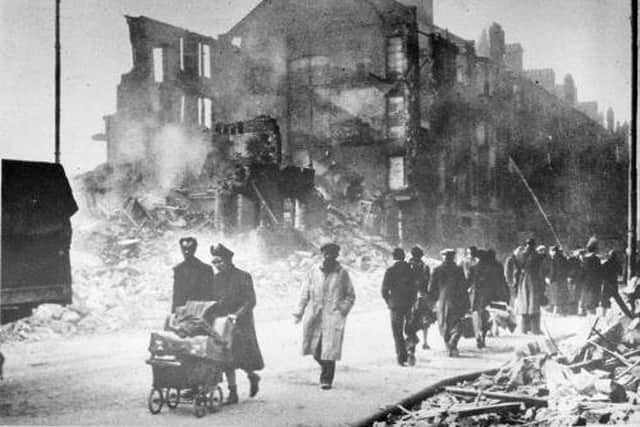Clydebank was 'not the primary target' for horrific blitz of 1941, says Scottish researcher
Researcher Marc Conaghan said his findings were “changing the narrative” of two deadly nights of bombing by the Luftwaffe given the volume of “Clydebank-centric” accounts which often sidelined the devastating impact on Glasgow and, more broadly, Clydeside.
Mr Conaghan has amassed thousands of records from archives in the UK and Germany to offer what he believes is a more accurate record of what happened on March 13 and March 14, 1941.
Advertisement
Hide AdAdvertisement
Hide AdWhile Clydebank is considered to have been targeted because of its munitions and shipbuilding industry, Mr Conaghan claimed the town was never mentioned in Luftwaffe records with it “very unlucky” to have been devastated the way it was.


Mr Conaghan, of Strathblane, Stirlingshire, said: “Contrary to the narrative that has become popularised in articles and books in the last 20 plus years, Clydebank was not and never was the only or primary target of the Luftwaffe.
"Several books and articles have claimed that German X and Y Gerat beam technology was pinpointed on Clydebank therefore making it the epicentre of the attack. This is factually incorrect.
"No German source from existing Luftwaffe records mentions Clydebank as a target for these raids. Predominantly the target mentioned is Glasgow and occasionally Clydeside.”
A total of 670 deaths were recorded in Glasgow overall.
On March 13, the Luftwaffe arrived in three waves from a mix of bases in Denmark, Netherlands and the north of France.
Three key locations were struck very early on – the Royal Navy Oil Depot at Dalnottar, a primary target for the Luftwaffe; the Singer Yard and Yoker Distillery, which was a site unknown to the Germans, Mr Conaghan said.
“One of them is meant, one of them could have been meant and one of them was a pure accident as they didn’t know that it even existed,” he added.Three “massive fires” were left burning parallel to the Clyde with the first wave of German planes then, as standard, dropping bombs in between the burning sites.
He said: “Clydebank sits between them all. The overwhelming death and destruction in Clydebank fits with the dropping bombs between the three large fires.
Advertisement
Hide AdAdvertisement
Hide Ad“But when the second wave comes in, the targets are obscured as thick black smoke is covering the whole of Clydeside.
“They revert to secondary targets which are railways bridges, main roads, waterways. That is when the majority of people in Glasgow start to die,” he added.
In the first three hours of the attacks, 533 people were killed in Glasgow.
Mr Conaghan said: “This is more than die in Clydebank in two days. This is not a league table of death tolls or devastation. I am not trying to highlight what happened in Glasgow or other places on Clydeside to play down or diminish what happened on Clydebank.”
Instead, he said he was trying to highlight the “true suffering and devastation all along Clydeside”.
Mr Conaghan added: “The reason for what happens in Clydebank and why it is so devastating in Clydebank – and I hate to say this as it sounds so flippant – is that it was very unlucky.”Mr Conaghan, who gave up a PhD at Glasgow University on the topic given the pressures of the pandemic, is now writing a book with parts of his research shared online at www.targetclydeside.co.uk.
Comments
Want to join the conversation? Please or to comment on this article.